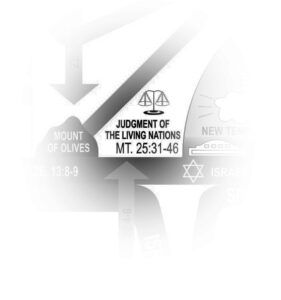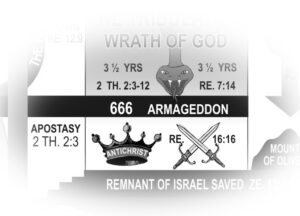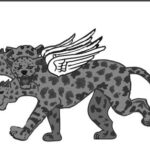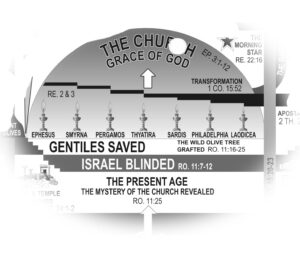 ‘After These Things’ Chapter 4.10 – The Remnant of Israel
‘After These Things’ Chapter 4.10 – The Remnant of Israel
From our book ‘After These Things – Summaries of John Nelson Darby’s Papers on Prophecy – and more…’ Compiled by Daniel Roberts. For more about this book click on the picture or CLICK HERE
A summary of the 10th Lecture by J N Darby on the Present Hope of the Church – Geneva 1840 entitled ‘Same subject as the preceding and Manner of its Accomplishment.’
In Jewish history, we see Jehovah’s glory
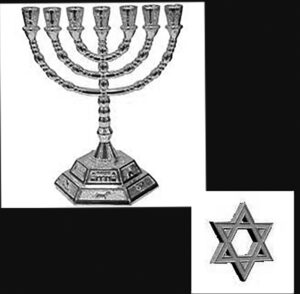 The Old Testament prophecies are occupied with the earthly blessings of the Jews; the gospel is not occupied with earthly blessings at all. Our blessings flow from the presence of Christ, the Son of David, a consequence of the new covenant. Whereas we know God as Father through grace, the Jews know Him as Jehovah the King – through His righteous judgments.
The Old Testament prophecies are occupied with the earthly blessings of the Jews; the gospel is not occupied with earthly blessings at all. Our blessings flow from the presence of Christ, the Son of David, a consequence of the new covenant. Whereas we know God as Father through grace, the Jews know Him as Jehovah the King – through His righteous judgments.
God acting in Grace
- To the Jews, it is the character of Jehovah the King – known by His judgments – by the exercise of His power on the earth. Their affairs are very dear to our God and Father.
- To the church, it is the character of Father, revealed to our souls by the gospel, by the spirit of adoption.
The gospel is a system of pure grace – a system which teaches us to act towards others as we have been acted on by the Father: ‘Be ye therefore perfect, even as your Father which is in heaven is perfect’ (Matthew 5:48). The people of Christ, now the children of God, ought to follow the example of the Saviour (that is, not to expect or wish judgment now, but to be gentle and humbly suffer wrong).
God’s faithfulness, changeableness, His almighty power, and His government of the whole earth are all revealed in His relationship towards Israel. The history of Israel gives us an insight into the character of Jehovah. God would reason with His earthly people: ‘Come now, and let us reason together, saith the LORD: though your sins be as scarlet, they shall be as white as snow; though they be red like crimson, they shall be as wool. If ye be willing and obedient, ye shall eat the good of the land: but if ye refuse and rebel, ye shall be devoured with the sword: for the mouth of the LORD hath spoken it. And I will restore thy judges as at the first, and thy counsellors as at the beginning: afterward thou shalt be called, The city of righteousness, the faithful city. Zion shall be redeemed with judgment, and her converts with righteousness’ (Isaiah 1:18-20).
God acting in Judgment
Jehovah will bless the nations; but the character of His kingdom is, that ‘judgment shall return unto righteousness’ (Psalm 94:15). At the first coming of Jesus Christ, judgment was with Pilate, but righteousness with Jesus; but when Jesus returns, judgment will be united to righteousness. On the other hand, Jehovah will console His people by acting in righteousness in their favour ‘By terrible things in righteousness wilt thou answer us, O God’ (Psalm 65:5), and He will re-establish them in earthly glory. The Jews will be the people by whom, and in whom, God sustains both His name (Jehovah) and His character in judgment and righteousness.
After the church has been Raptured, the first to be gathered will be those who had rejected Jesus and were guilty of His death. As unbelievers, they will find an alternative to their true Messiah, and become subject to the Antichrist. The Israelites (two tribes) may be returning to their land (far more so now than in JND’s time), but God takes no notice of them[1].
The Remnant
Now Israel is buried as a nation among the Gentiles. In its revival, God will stand up for His people in their time of distress and deliver a remnant.
There will be an uninterrupted chain of blessings from Jehovah. Jehovah will be the hope of His people, and the strength of the children of Israel. This will be the case when the judgment of God falls upon the nations.
‘Therefore, behold, I will allure her, and bring her into the wilderness, and speak comfortably unto her… And I will give her her vineyards from thence, and the valley of Achor for a door of hope: and she shall sing there, as in the days of her youth, and as in the day when she came up out of the land of Egypt … And I will betroth thee unto me for ever … And I will sow her unto me in the earth; and I will have mercy upon her that had not obtained mercy; and I will say to them which were not my people, Thou art my people; and they shall say, Thou art my God.’ (Hosea 2:14-23).
‘Afterward shall the children of Israel return, and seek the Lord their God, and David their king; and shall fear the Lord and his goodness in the latter days … after that they shall seek Jehovah and David – the well-beloved, or Christ.’ (Hosea 3:4, 5) ‘And I will bring again the captivity of my people . . . and I will plant them upon their land, and they shall no more be pulled up.’ (Amos 9:14, 15.)
This is of course yet to come, and the words, ‘in that day will I raise up the tabernacle of David that is fallen,’ (Amos 9:11) are quoted in Acts 15:16, to prove that God always had determined to have a people (a Jewish residue) from among the Gentiles.
God is said to be ‘silent in his love’ (Zephaniah 3:17). He lavishes all this on the Remnant. A few verses earlier the prophet said, ‘The remnant of Israel shall not do iniquity, nor speak lies, neither shall a deceitful tongue be found in their mouth; for they shall feed and lie down, and none shall make them afraid’ (v.13). The spirit of grace and supplication shall be poured out upon the Remnant of Israel – ‘ all the families that remain’; (v14) and ‘they shall look upon him whom they have pierced, and mourn.’ (Zechariah 12:10).
Nevertheless, the Remnant shall ‘be brought to the Lord of hosts, from a people rent and torn in pieces … to the place of the name of the Lord of hosts, the mount Zion’ (Isaiah 18:7).
This prediction, delivered by Jesus Himself, gives us the assurance that Christ will restore Israel here, and reign in her midst: ‘O Jerusalem, Jerusalem, thou that killest the prophets, … your house is left unto you desolate …till ye shall say, Blessed is he that cometh in the name of the Lord.’ (Matthew 23:37-39.). Israel will see Jesus, ‘The stone, which the builders refused, is become the head stone of the corner.’ (Psalm 118:22)
When the Lord entered Jerusalem there was only a partial fulfilment of the prophecy ‘Rejoice greatly, O daughter of Zion; shout, O daughter of Jerusalem: behold, thy King cometh unto thee’’ (Zechariah 9:9 and John 12:15). In John, the Holy Spirit omits, ‘He is just, and having salvation’. Far from saving Himself, He saved us.
The Ten Tribes
However, the first to be gathered are those who rejected Jesus, those who were guilty of His death. (The ten tribes were not guilty of this crime.) Those who rejected Christ will be subjected to the Antichrist; they will make ‘a covenant with death, and an agreement with hell’ (Isaiah 28:15), but their covenant will shatter all their hopes. Having united themselves to Antichrist, they will suffer the consequences of this alliance, and at last, will be destroyed.
The two tribes are representative of all twelve. Given the above, the two tribes will also be lost and will need to be born in a day. Darby does not go into a nation born in a day – the coming together of the 10 tribes.
After His appearance, (therefore just before the Millennium – the Day of the Lord), the Lord will gather together the elect of the Jewish nation, from among the Gentiles. This will be a time of great happiness. (See Matthew 24 31; compare Isaiah 27:12-13, and Isa. 11:10, 12.) – especially the latter (See Chapter 4.9, above).
[1] A strong statement but those are JND’s words. He goes on, Israel is abandoned to the nations,


